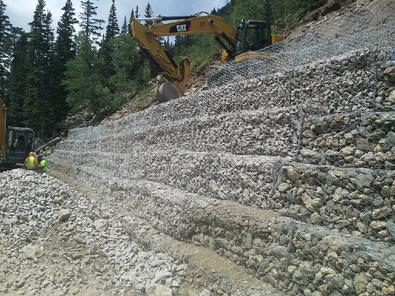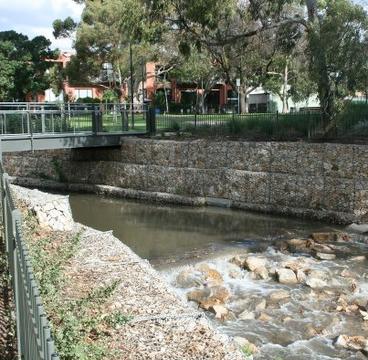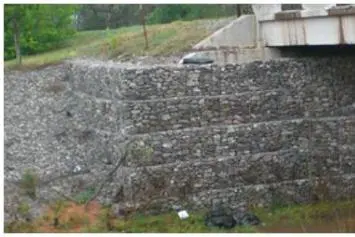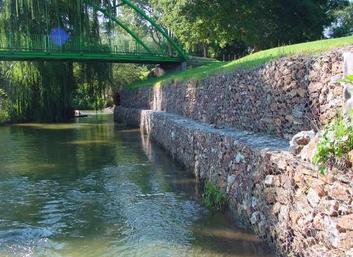TYPES OF RETAINING WALL MATERIALS

Retaining Wall Material
A retaining wall holds back water or earth and is made with various materials. You can consider installing a retaining wall if your property has a steep slope. Retaining walls are also used in coastal areas and as bridge abutments.
Types of Retaining Wall Materials
Retaining walls come in all types and sizes and can be made of several materials, each with advantages and disadvantages.
Gabions
Pros: Gabions, rectangular or square metal cages or box filled with concrete, rocks, or sand, are the best material for retaining walls in certain situations. They were used in ancient Egypt and are still used today because they're incredibly effective at preventing erosion and landslides. Use them in vulnerable areas to protect from damage. Gabions are affordable and easy to install and don't require any special skill set. They're an eco-friendly option because you can use recycled materials. They become stronger and more durable with time as they integrate into the environment through vegetation and soil capture. With proper installation, gabions also look sleek, clean, and modern.
Cons: The main disadvantages of gabions are that they can be labor-intensive to install and that you must make sure to match the gabion material with the site-specific conditions to keep them from rusting. Otherwise, we recommend gabions as a great retaining wall material.
Masonry
Pros: Stone or brick retaining walls offer a unique aesthetic appeal and look natural. They're a good fit for a rustic look that blends into most landscapes. The elegant appearance of brick and stone makes them popular choices in residential and commercial properties. They're also durable and don't require large machinery during installation.
Cons: Masonry walls require proper drainage to reduce soil erosion and hydrostatic pressure. Brick may be beautiful, but it's more expensive than other materials due to the specialized labor required during installation. You must also hire the right people to build the wall and ensure it's adequately fortified.
Concrete
Pros: Ideal for modern landscaping, poured concrete is one of the most durable options available today when it comes to building a retaining wall. It can be customized and versatile as it can look like other materials, such as mortar stone. Poured concrete also doesn't require heavy maintenance, but professional installation is required.
Interlocking concrete blocks are also durable and stable, making them ideal for residential and commercial applications. They resist rot, fire, and rust.
Cons: Concrete retaining walls should be carefully designed, with proper drainage and reinforced concrete footing to avoid weakening the structure. If you go for the precast panel route, you may also need special equipment. When choosing concrete, make sure you don't plan to change the wall's placement because removing this type of wall is complicated.
Natural Rocks
Pros: Do you prefer a classic look to elevate your outdoor space? With their endless design possibilities, natural rocks may be the best option for your residential space. Retaining walls made with rocks can last several years without needing repairs or maintenance. Environment-friendly and not prone to chipping or cracking, natural rocks can withstand the elements and are resistant to freeze-thaw cycles.
Cons: The downside to using natural rocks for retaining walls is the cost. They can be quite expensive because, depending on the size of the wall, you may need more workers to cut and set each piece. The design can also be complicated and tricky, and it requires the services of an experienced landscape architect, which can cost more money.
Plastic
Pros: Plastic retaining walls are durable and cost-effective. Consider using plastic if you want a retaining wall that can look like wood but doesn't rot. Plastic is also easier to transport than other materials and requires less maintenance. Additionally, it's affordable and can resist pests or corrosion.
Cons: Recycled plastics can resist chemicals and are environment-friendly, but polypropylene is also flammable. If you want a material that can withstand the elements, go for gabions.
Steel
Pros: Steel can be recycled, making it an environment-friendly option for retaining walls. It's flexible, durable, strong, and aesthetically pleasing. Its construction can minimize business disruptions because it's lightweight and easy to install. You can use steel for larger projects and industrial applications, such as mining land reclamation projects or wastewater treatment plans.
Cons: Steel retaining walls may offer several advantages, but because steel is made of carbon and iron, it can rust in certain environments. Consider the environmental factors and building codes if you plan to build a steel retaining wall. Steel also needs to be fireproofed because it can be a conductor of heat.
Stucco
Pros: The biggest advantage of using stucco as a retaining wall in your outdoor space is its versatility and customization options. You can choose a polished finish or a modern or Mediterranean look. You can also use stucco with concrete blocks or natural stone, creating a more distinctive look. Ideal for garden beds and terraces, stucco retaining walls can withstand temperature fluctuations and weather conditions.
Cons: Hire a skilled contractor if you're going for a stucco retaining wall; the structure is prone to water retention, so it needs to be properly installed. Installation can be expensive, and this type of wall requires more maintenance. You can avoid water damage by filling any cracks or holes to avoid the development of an even bigger problem.
Timber or Wood
Pros: Retaining walls made with wood or timber are easy to install and affordable. They only require basic stone footing and deadmen anchors, making them a popular option in residential homes. Compared to other materials, wooden walls are simple to construct.
Cons: Wood isn't as strong or durable as gabions or steel. Avoid building wooden retaining walls more than 4 feet high, as they may collapse or become damaged. Wood or timber needs to be maintained to prevent rotting. Make sure the wood is properly installed, so it lasts longer.
Contact Gabion Supply
Gabion Supply offers architectural and custom gabions for various applications, including erosion control, landscaping, and bridge protection. We sell gabions of all types and sizes. Contact us today.









